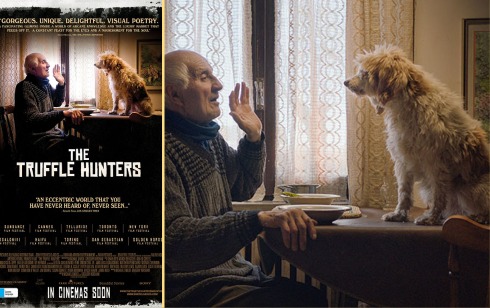 THE TRUFFLE HUNTERS. Starring: Piero Botto, Sergio Cauda, and Maria Cicciu. Directed and produced by Michael Dweck and Gregory Kershaw. Rated M (Coarse language). 84 min.
THE TRUFFLE HUNTERS. Starring: Piero Botto, Sergio Cauda, and Maria Cicciu. Directed and produced by Michael Dweck and Gregory Kershaw. Rated M (Coarse language). 84 min.
This sub-titled Italian-American documentary follows a group of men hunting for the white ‘Alba’ truffle – the most highly regarded, and costly, of all truffle varieties. The truffle in question, known as ‘tartufo bianco’, is rare, and grows deep inside the picturesque Piedmont forests of northern Italy. The Alba truffle is desired by people who have to be rich enough to afford it. The truffle has never been cultivated, and consistently remains elusive to those who come to search for it.
All of the Truffle Hunters in this film are over 70 years of age and many are well into their 80s, and only a small number of them exist to ply their trade. The documentary distinctively tracks the path of the white truffle from the forest earth to the restaurant plates of the rich and powerful.
The Truffle Hunters have unique access to the Alba truffle from training their dogs to locate it, and dig it up. The elderly owners of the dogs sell what their faithful dogs find, and any locations that yield ‘tartufo bianco’ are kept secret.
The knowledge of what to do to locate the delicacy is handed down through successive generations. The Truffle Hunters refuse to reveal where the truffle is found, even under family and social pressure to do so. They simply disappear with their trained dogs into the forest, often working together for long hours into the night to find what both dog and man are searching for.
The movie is beautifully produced and the camera work in the documentary is extraordinary. Shots of woodland surrounds are carefully composed and photographed, and much of the background music has been originally composed for the film. The film provides rare and beautiful footage of the Truffle Hunters and their dogs at work, with the camera mounted at times on the dogs, digging furiously for the elusive delicacy. The result is a view of the Italian countryside, and the people who live in it, which is lyrical in tone and culturally fascinating. The film is not narrated at all. The film’s imagery, simply and informally, creates the magic that sustains what the movie reveals.
The film conveys a passion for dogs who are beloved of their owners. The Truffle Hunters are totally devoted to their dogs. The scenes associated with the film’s story-line are communicated naturally, and the film’s cinematography compels the viewer, as a participant in the hunters’ experience, to construct the present in ways that highlight the traditions and practices of the past.
A handful of ‘tartufo biancos’ sells on the commercial market for several thousand euros, and the film makes the telling point, with humour, that only socially advantaged persons can afford to eat the precious mushrooms. When the mushrooms are sold by the Truffle Hunters, only a few hundred Euros actually change hands. Greed is not an issue for the Truffle Hunters – they live only for what they can find, although they know that greed is important to others. Shadowy middle men help to sell the truffles. The harsh reality for the hunters is that they will grow too old to hunt safely, and they don’t know who will be there to pass their wisdom onto. Some are even worried they will not be able to hunt the white truffle in heaven, when they die. A major issue for the film, that deserved more attention, is the looming threat of climate change and de-forestation, which signifies that the hunters’ unique way of living may soon perish.
In a world of pandemic anxiety, this film is a veritable tonic to discover life’s hidden joys. The documentary projects the joy of a people, who live in complete harmony with their surrounds. It is a special tribute to the film’s directors, Michael Dweck and Gregory Kershaw, that they managed to earn the trust of the Hunters sufficiently for them to produce a life-affirming documentary. This is a film which gives us, as viewers, a wonderfully close and intimate familiarity with an extraordinary group of people, and we learn about their culture by participating in their life, exactly as it unfolds.
Peter W Sheehan is an Associate of Jesuit Media
Sony Pictures Classics
Released 18 February 2021